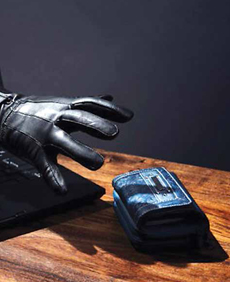Issue No.12 / August 16,2015

Though lottery has been officially banned in the country, cyber looters are using electronic mail and fraudulently pilfered personal data, declaring you the winner of some high value lottery and thus exploiting the gullible among you and stealing your valuable, hard-earned money. But why does our criminal detection and penal system so helpless against such crime?
How would you react if you get a poorly drafted congratulatory email with many spelling mistakes, bad grammar and wrong sentence construction saying that you’re the winner of Rs.5.5 crore worth British lottery? Ninety nine per cent chances are that you would immediately junk it into the spam box as you had never participated in any such lottery.
But what would be your reaction if you get a similar mail, but penned in a very polished manner and signed by none other than the Governor of the Reserve Bank of India (RBI), Dr. Raghuram Rajan, along with his photograph as well as showing a picture of the RBI on top?
This time there are fair chances that you’ll find it difficult to ignore it as there is no logical reason to disbelieve a serious, official-looking mail from someone as big as Dr. Rajan! More so as, besides this petty amount, all he asks for is some very basic information about you such as your address, mobile number and bank account number, etc.
And, the reward in lieu of all this simple information is a whopping Rs.5.5 crore, an amount you had not thought of even in your wildest dreams!
To cap it all, even the tone of the letter is such that it requests you, the beneficiary, to claim the said deposited amount in British Pounds in your name which has to be “released urgently” as, following his recent meeting with the UN Secretary General Ban Ki-Moon, it has been agreed upon that “keeping such unclaimed funds in the government basket for too long” will be an “unfair practice” for “one reason or the other for tax accumulation.” Hence, it implores you to claim it “within two days” by paying just the “crediting fee” of Rs.9,500/- only so that Rs.5.5 crore could be transferred into your account, that too, in “just 40 minutes” of depositing the required fee.
No wonder, with such a luring trap in front of you, there is every possibility that you’ll pay the required processing fee in the hope that in “just 40 minutes,” the said amount would get transferred into your account, making you say Wow!
However, if you’ve actually done it and are now wondering what to do, don’t worry, you’re not alone. There are many unsuspecting individuals like you who have also got similarly cheated by these fraudsters who play on nothing but your greed.

“Once you’ve paid the money, recovering it is very difficult. That’s why we’ve been warning customers regularly through advertisements in newspapers, through leaflets, RBI’s website and such other sources, but we feel bad when, despite all these awareness measures, hundreds of people fall prey to such cyber criminals every year. What’s even more shocking is that most of the time, it’s not the poor or uneducated but the well-educated, intelligent people who, knowing well that there could be tricksters around, get caught into this trap because of their sheer greed to become rich overnight,” she said. Citing a recent example, she referred to a very intelligent IIT Kanpur student who initially was not willing to believe it, but eventually got convinced that he had been duped of his father’s hard-earned “several lakhs” of Rupees. He realised what a fool he was, as his “laalach” had led him to a point of no return! “We understand their frustration but the point is, why do you allow such people to take advantage of your situation?” she asked.
Make your password as difficult as possible.Don’t fall for lottery/jackpot eMails.in case, you’ve fallen prey to traps laid down by such scaMMers, report the Matter to the police.
So, what’s the way out? Can something be done to identify and escape these frauds?
“It’s going on for many years now. This is a kind of guerilla warfare where the attackers are anonymous people. They constantly innovate and keep their modus operandi changing and sometimes they have planted their men within government systems too. But the thing is, if you understand one fundamental thing, you’ll never get cheated, and that is: Nobody ever gives you money for free. After all, how many times have you given even a ten rupee note to a beggar?” asked Delhi’s DCP (Cyber Cell), Rajneesh Garg, at the Mandir Marg police station.

But how can one save oneself from such traps? Giving vital tips, advised he, “Make your password as difficult as possible. Don’t fall for lottery/ jackpot emails, avoid uploading private content on internet. In case, you’ve fallen prey to traps laid down by such scammers, report the matter to the police in the very first one hour after the crime because the faster you report, the better will be the chances of any recovery, though in most cases it is next to impossible to recover the money deposited.”
Is there no mechanism by which one can catch those who lay such traps? Answering this, an Intelligence Bureau (IB) sleuth who, for obvious reasons, wouldn’t like to be named, said: “Well, going by the email id and phone numbers of such criminals, we can trace their origin but we can’t go far. Because most of the times these mails and calls come from abroad, mostly from African countries like Nigeria and Ghana, we’ve no way to reach their servers.”
However, continuing further, he said, “Lately, going by the sheer amount of money involved, we’ve traced an important trail which leads to Pakistan—most likely to a certain Dawood Ibrahim-type modular—which is running such fraudulent lottery schemes all across India through a well-organised syndicate, based most likely in Karachi, employing several Indian agents to suck huge amounts from the gullible,” he revealed.
So, what can a common man do in such a situation? Answered he, “The way we’re increasingly getting dependent upon internet for all our needs, by 2020, conventional crimes will less in number and cyber-crimes will be our biggest menace”.
So, the message is loud and clear: Cyber dacoits are all around you. They don’t use any physical violence or weapon against you. They don’t even go to a bank to rob you. They are not even present at the scene of crime. Yet they are omnipresent and out to loot you. Getting into their trap is entirely your choice. “Quite often, these criminals make phone calls to people, pretending to be bank executives, and claiming that they are updating their servers, and thus need all your banking details. If you’ve fallen into the trap, you’re gone because once the fraud has taken place, no bank or police official is going to help you much”. concluded he, with a twinkle in his eyes.
By Pradeep Mathur